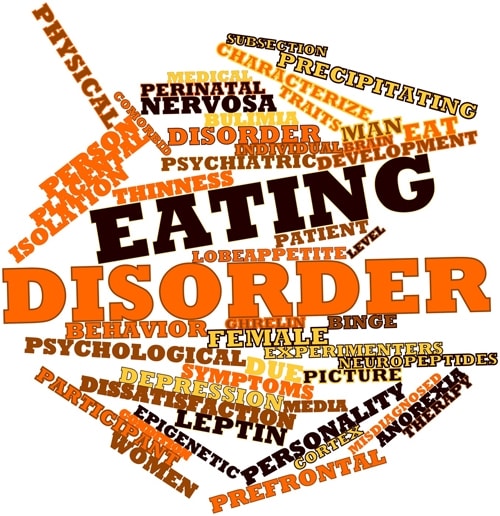Many times when people hear that a friend or a loved one has been diagnosed with an eating disorder they may think “Anorexia” but that is not always the case. Eating disorders are extremely complex issues with a variety of causes and triggers.
The following information is a brief summary of the Feeding and Eating Disorders described in the American Psychiatric Association’s Fifth Edition of the Diagnostic and Statistical Manual of Mental Disorders (DSM-5), published in 2013.
Anorexia Nervosa
- Inadequate food intake leading to a weight that is clearly too low.
- Intense fear of weight gain, obsession with weight and persistent behavior to prevent weight gain.
- Self-esteem is overly related to body image.
- Inability to appreciate the severity of the situation.
- Binge-Eating/Purging Type involves binge eating and/or purging behaviors during the last three months.
- Restricting Type does not involve binge eating or purging.
Binge Eating Disorder
- Frequent episodes of consuming large amounts of food in short periods of time, but without the behavior to prevent weight gain, such as self-induced vomiting.
- An out of control feeling during the binge eating episodes.
- Feelings of strong shame or guilt regarding the binge eating.
- Indications that the binge eating is out of control, such as eating when not hungry, eating to the point of discomfort or eating alone because of shame about the behavior.
Bulimia Nervosa
- Frequent episodes of consuming large amounts of food followed by behaviors to prevent weight gain, such as self-induced vomiting.
- An out of control feeling during the binge eating episodes.
- Self-esteem is overly related to body image.
Other Specified Feeding or Eating Disorder
(Described as Eating Disorder Not Otherwise Specified (EDNOS) DSM-IV)
- A significant distress or impairment caused by a feeding or eating disorder, but does not meet the criteria for another feeding or eating disorder.
- Examples include:
- Atypical anorexia nervosa (weight is not below normal)
- Bulimia nervosa (with less frequent behaviors)
- Binge-eating disorder (with less frequent occurrences)
- Purging disorder (purging without binge eating)
- Night eating syndrome (excessive nighttime food consumption)
Additional Eating and Feeding Disorders
- Avoidant/Restrictive Food Intake Disorder
- Pica (characterized by an appetite for substances largely non-nutritive, such as ice, clay, chalk, dirt, or sand.)
- Rumination Disorder (chronic condition characterized by effortless regurgitation of most meals following consumption.)
- Unspecified Feeding or Eating Disorder
So as you can see, there is much more to eating disorders than someone simply trying to be thin for the sake of vanity. Eating disorders involve a distorted, self-critical attitude about weight, food, and body image. These negative thoughts and feelings are what fuel the damaging behaviors.
We Are Here to Help
The Meadows Ranch has treated eating disorders for more than 20 years. We know recovery from an eating disorder is possible. Based on feedback from patients, families and professionals, the vast majority of our patients remain committed to a life of health, balance and purpose.
For additional information about The Meadows Ranch’ specialized treatment for eating disorders, please call to speak to one of our caring Intake Coordinators at 866-390-5100 and we will contact you with the information you need.

